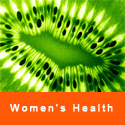Women’s Bone Health
What is the role of Calcium? Calcium is deposited in bones up until age 18, when bones stop growing in mass. If not enough Calcium is deposited in the bones, they may become weak later and lead to osteoporosis (thinning of bone tissue and loss of bone density)
Why should women be concerned? Women have greater risk of bone loss than men do after the age of 50. Women over 50 should do bone density tests with their doctor.
Why do you need to take Vitamin D along with Calcium? Vitamin D helps in the absorption of Calcium in the digestive system. Without Vitamin D, Calcium will not be absorbed as well from food. For women under 50, the recommended amount is 400 to 800 IU. For women over 50, the recommended amount is 800 to 1,000 IU per day.
Vitamin D can be obtained by:
1. Being in 10-15 minutes of sun each day
2. Food: Fatty fish (mackerel, salmon, tuna), eggs, milk, some brands of orange juice, cereal
3. Vitamin D supplements
How much Calcium is recommended and what are good sources? Calcium should be consumed everyday. Before age 50, the recommended amount is 1,000 mg a day. For women over 50, 1,200 mg is recommended per day. Sources of Calcium include milk, yogurt, cheese, fortified cereals and juices.
Women need 3 servings a day of Calcium rich foods. Examples:
- 1 cup of low-fat or fat-free milk
- 1 cup of low-fat or fat-free yogurt
- 1 ounce low-fat or fat-free cheese
- 1½ cups cooked edamame (soybeans)
- 1 cup calcium-fortified juice
- 3 ounces canned sardines, with bones.
How can you prevent bone loss? Consume daily servings of calcium and vitamin D and exercise.
source: http://www.eatright.org/Public/content.aspx?id=6810
Heart Health
What is Heart Disease? Heart Disease is the leading cause of death of women in America. Coronary Heart Disease is caused by buildup of fats in the arteries over the years. When fat builds up blood flow in the artery can decrease and clots can form which can result into heart attack.
Factors that Increase Risk of Heart Disease
The following factors can change how susceptible you are to developing Heart Disease:
- Aging: As women get older, their risk for heart disease goes up.
- Gender: More women than men have heart attacks and strokes as they age.
- Family History: If a woman has a close blood relative with heart disease, the chances she will have heart disease are greater.
- Previous Heart Attack: If a woman has already had a heart attack, she is at risk of having another one.
- Overweight: overweight or obese women have a higher risk of heart disease.
- Sedentary: lack of physical activity increase the risk for heart disease
There are many ways to lower your risk for Heart Disease. The most important factor is a healthy diet.
Healthy Lifestyle Habits
Good diet includes: Whole grains, fruits, vegetables, low-fat dairy, lean protein, and healthy fats (Omega-3 twice a week from salmon, mackerel, tuna and ALA from flaxseed or walnuts). Avoid eating too much fat: fat should make 20-35% of the total calories consumed, with maximum 10% coming from saturated fat. Saturated fat is bad for the heart and the blood vessels. Unsaturated fats such as that in olive oil, avocadoes, walnuts and almonds, is good for cholesterol levels and heart health. If you are overweight or obese, losing weight is an important step in reducing risk for Heart Disease. Along with exercise, reducing your caloric intake 500 calories a day is a gradual way to lose weight which offers the best results.







